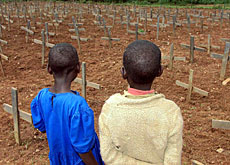Future aid for Rwanda comes under review

Switzerland’s senior aid official is travelling to Rwanda to decide the future of a SFr5 million ($4.2 million) development programme in the central African nation.
Walter Fust’s visit comes as Rwanda launches the biggest phase of hearings to try up to one million people suspected of involvement in the 1994 genocide.
The Swiss government has to decide whether to continue the current aid programme, which came to an end in 2004, and what form any future assistance should take.
Fust, who is head of the Swiss Agency for Development and Cooperation (SDC), is due to meet the Rwandan authorities, non-governmental organisations (NGOs) and representatives of other donor countries during his four-day visit.
He will also tour projects funded by the SDC, which has provided an average of SFr5 million a year since 1998.
“This visit should allow Mr Fust to make a decision on the future of the special cooperation programme with Rwanda,” said SDC spokesman Harry Sivec.
In the aftermath of the violence in which 800,000 people died in 100 days, Switzerland concentrated on immediate humanitarian aid, before drawing up a special aid programme for Rwanda in 1998.
Four years ago, the Swiss authorities switched to longer-term cooperation, focusing on good governance, justice and human rights, and the transition to democracy.
Extending aid
According to Erwin Jutzet, a member of parliament’s foreign affairs commission, there is a general consensus that the package should be extended.
“The government will have to come to a decision soon, but there is no need to stop [the aid programme] or increase it straightaway,” said Jutzet.
The parliamentarian says the issue is the subject of bitter debate among politicians, some of whom are critical of interference by the Rwandan military in the Democratic Republic of Congo.
They are also concerned about “bad governance” and the slow transition to democracy in Rwanda.
According to the SDC, Rwanda is in the process of re-establishing confidence among the various population groups and between the population and the central government.
Elections
In presidential and legislative elections in August and September 2003, President Paul Kagamé won a seven-year mandate with 95 per cent of the vote and his Rwanda Patriotic Front party won an absolute majority in the National Assembly.
Switzerland – along with the European Union – criticised irregularities during the elections.
Several Swiss NGOs have urged the government to reinforce peace and stabilisation efforts in the Great Lakes region of Africa.
Ivan Pasteur, the SDC official responsible for western and southern Africa, indicated last month that the development programme was likely to continue, but would be more closely linked to Burundi and other nations to the east of Rwanda.
swissinfo with agencies
Swiss aid for Rwanda:
2002: SFr4.2 million
2003: SFr6.8 million
2004: SFr5.9 million
Average since 1998: SFr5 million a year.
The SDC concentrates mainly on Kibuye Province in the west of the country.
It began a health programme in Kibuye in August 2002, focusing on the prevention of malaria, HIV/Aids, and diarrhoeal diseases in mothers and children.
The SDC has mandated the Swiss Tropical Institute in Basel to carry out the programme.

In compliance with the JTI standards
More: SWI swissinfo.ch certified by the Journalism Trust Initiative









You can find an overview of ongoing debates with our journalists here . Please join us!
If you want to start a conversation about a topic raised in this article or want to report factual errors, email us at english@swissinfo.ch.